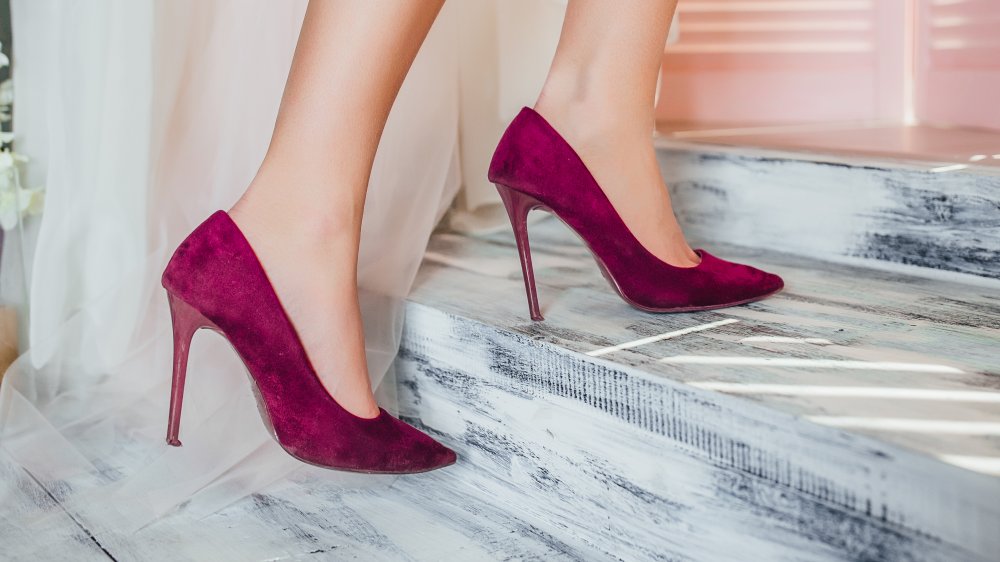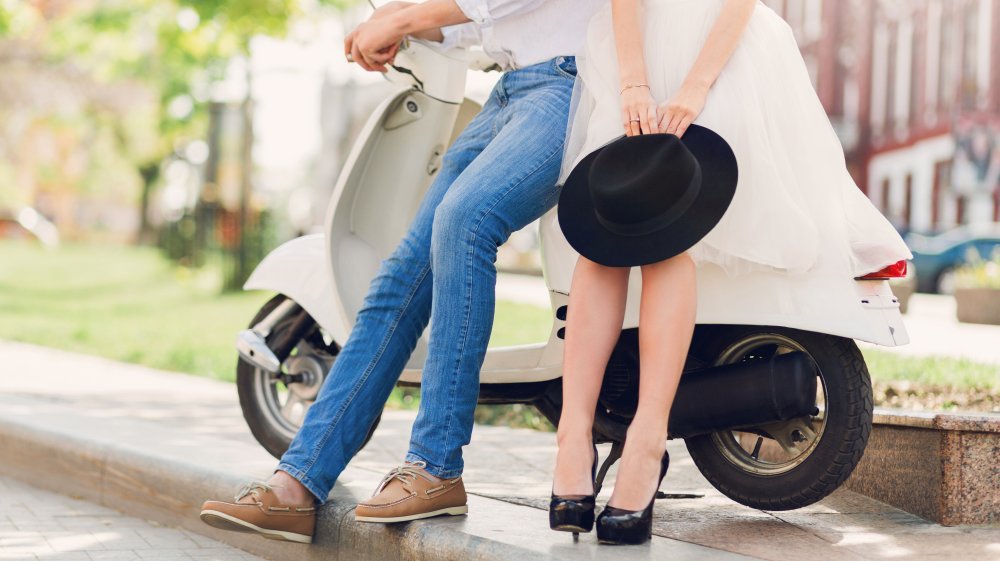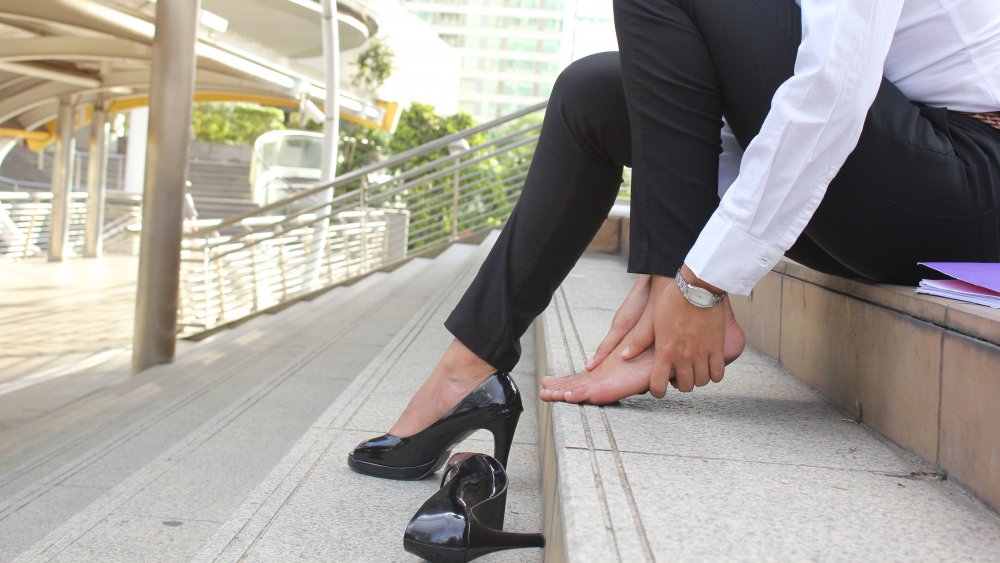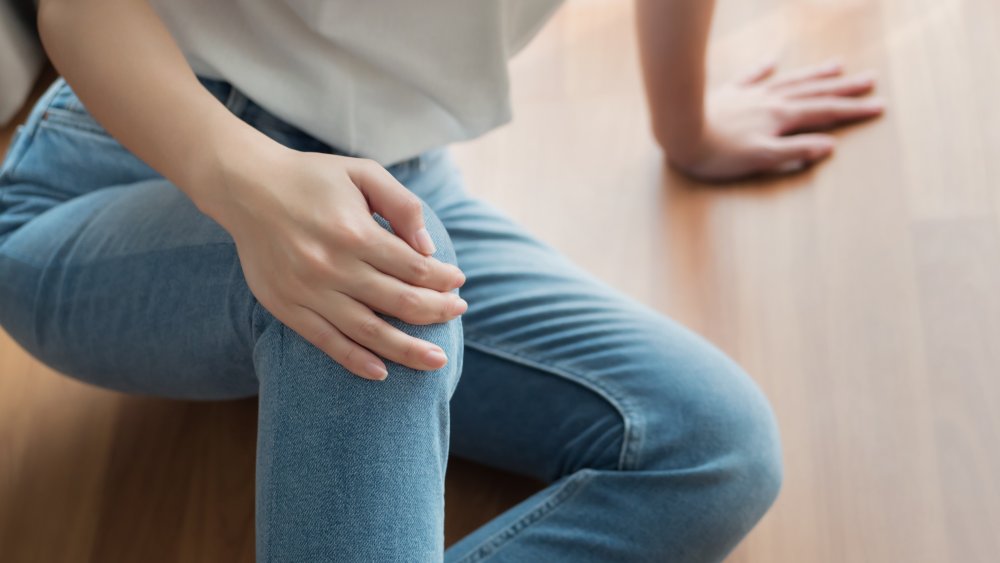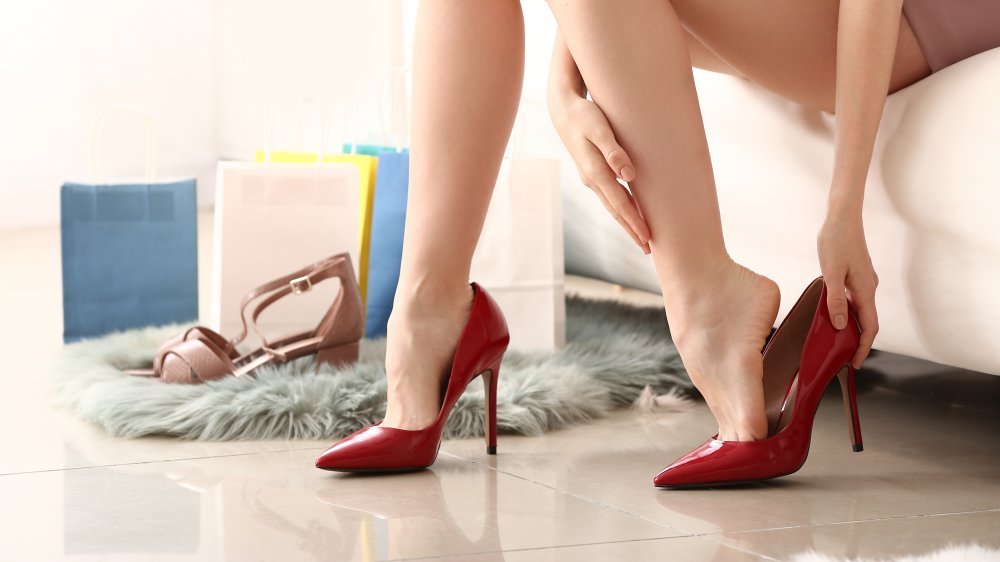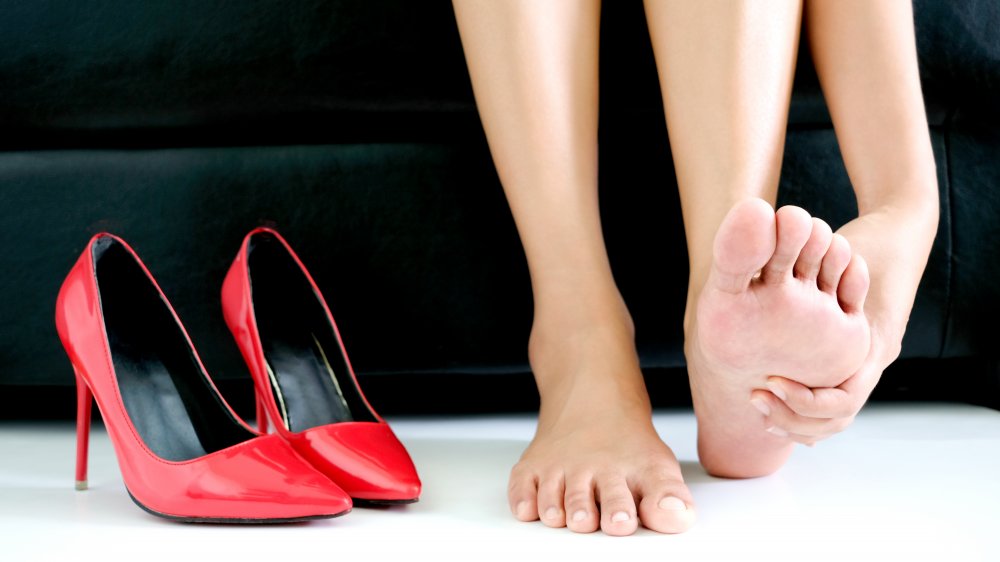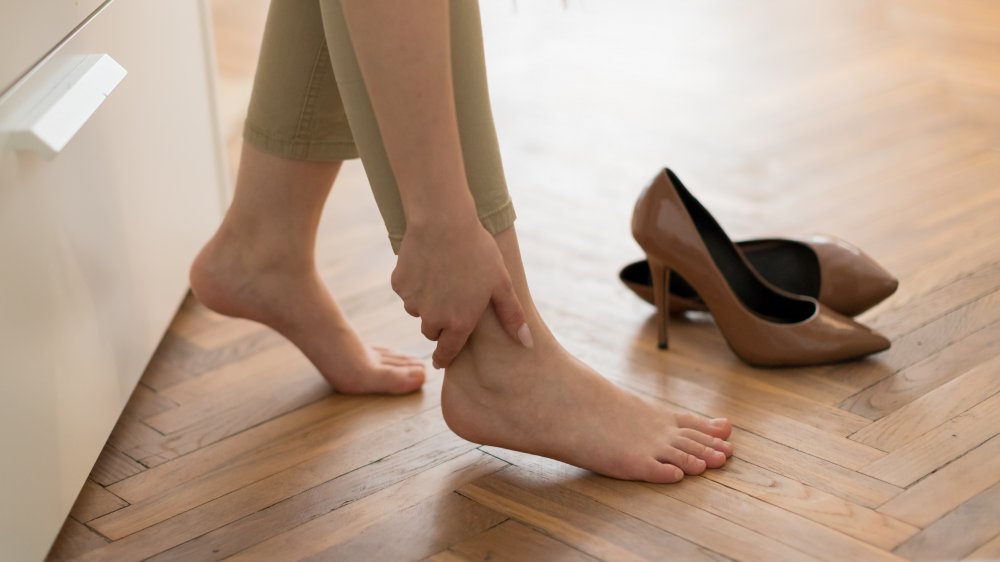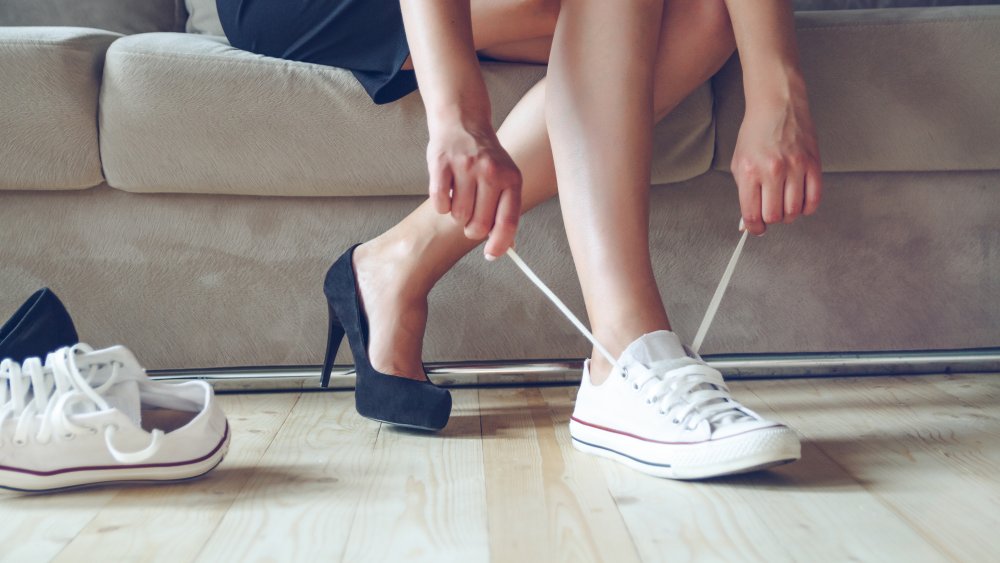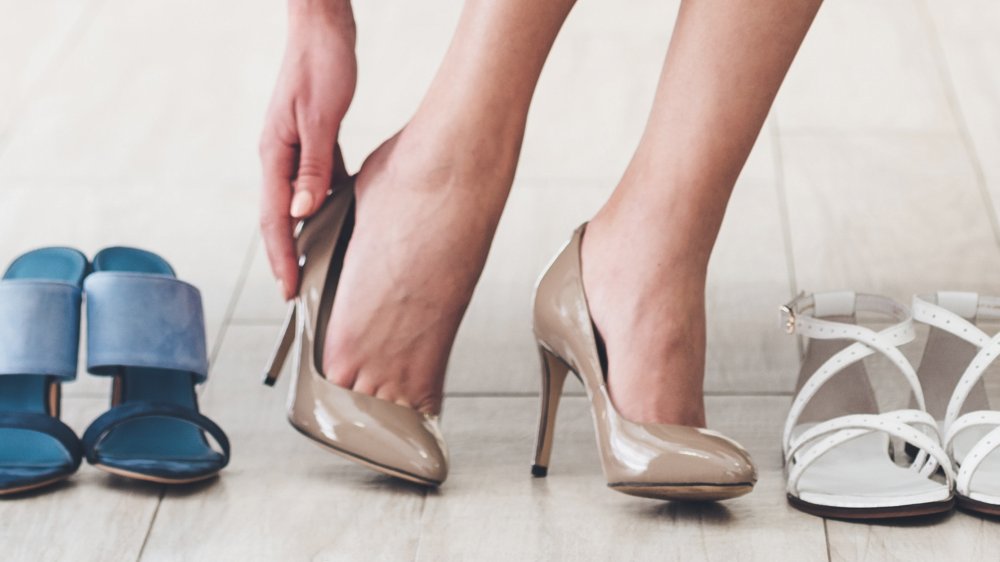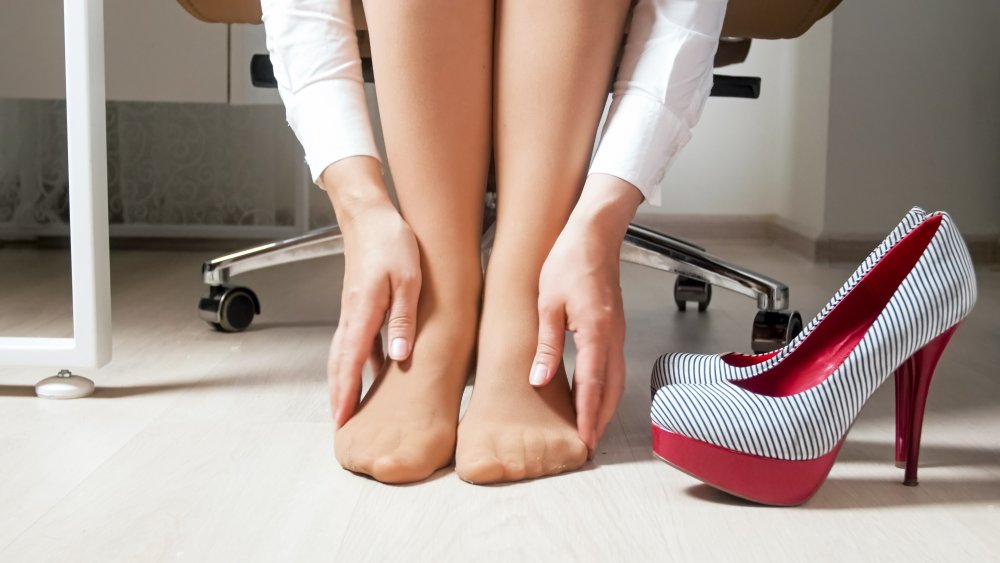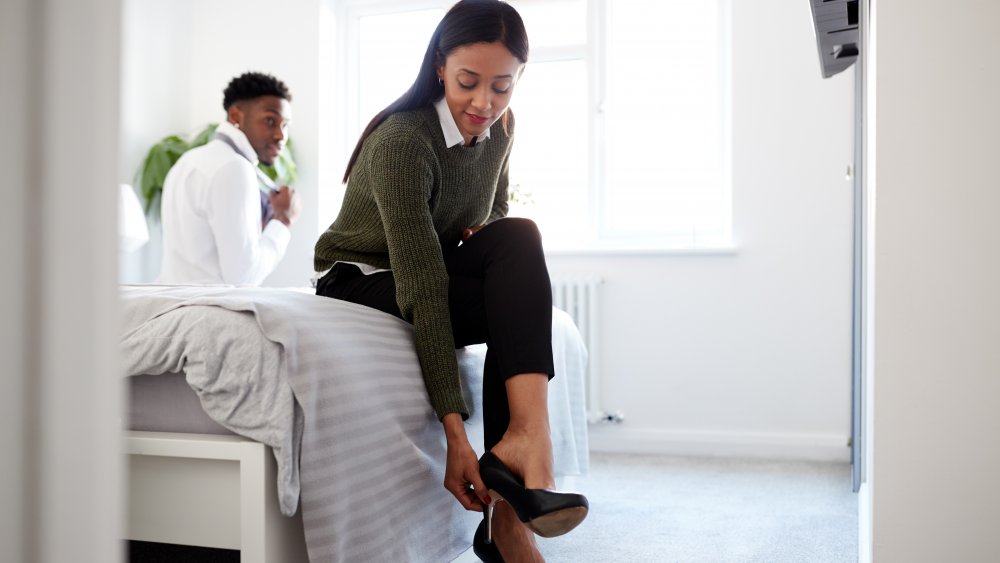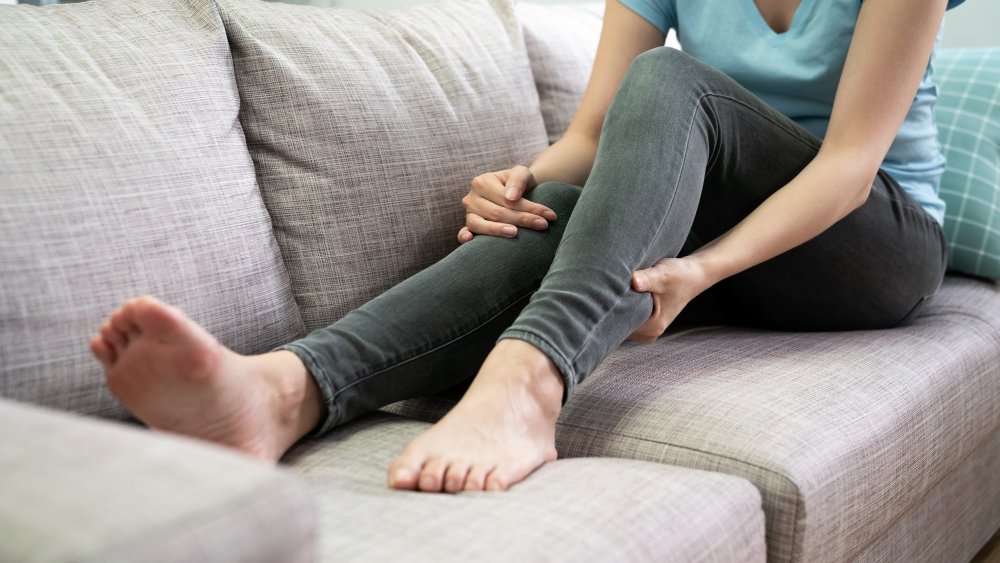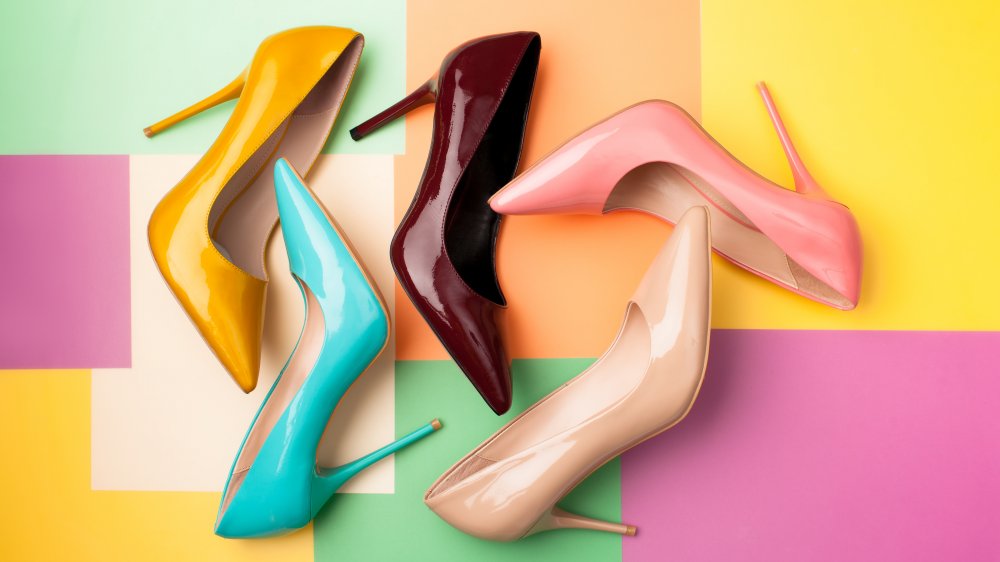When You Wear Heels Every Day, This Is What Happens To Your Body
Lots of women wear heels every day. After all, plenty of people are willing to suffer a little bit in order to achieve their idea of beauty. Whether it's going under the knife for cosmetic surgery, sitting down for some cool sculpting, or spending hours and hours in your tattoo artist's chair, there are plenty of things that folks do to change their bodies even if it hurts. After all, isn't it worth it to have those cherry blossoms adorning your arms or to be able to appreciate your new and improved silhouette?
Of course, it doesn't have to be a surgical procedure or a permanent augmentation, as plenty of people love nothing more than how they look in their favorite pair of high heels. They can add a whole new element of style to your ensemble, making your legs appear longer and your look all the more elegant.
Unfortunately, wearing high heels can cause damage to your body if you wear them every day for a number of years. And while it's not all bad news, there are definitely things that you should know about if you slip into your pumps on the reg. Read on to find out what happens to your body when you wear heels every day.
You may stand taller if you wear heels every day
One of the main reasons people love to wear heels every day, other than how cute they can make you look, is that they can make you physically taller. For one, heels can add some height on their own, especially if you're coordinated enough to rock three-inch heels. That's certainly a good way to give yourself a lift!
Another way that pumps can give you a boost is by making you stand taller, says Dr. Nelya Lobkova, a board-certified podiatrist. "High heels naturally lean the torso forward. In response to this tilt, the shoulder and upper back push down and out improving posture and appearance," she explained to The List. "The ideal posture is slightly relaxed at the knees with a slight forward tilt."
Of course, you have to have good coordination and balance to walk in heels, especially if you're wearing stilettos. So, if you have the poise to pull it off, consider yourself lucky!
If you wear heels every day, you might feel more attractive
Have you ever noticed that you tend to attract the admiration of others when you wear heels? Perhaps people might compliment you more, telling you how nice you look that day? Well, there's a reason for that, according to science, as noted by sex counselor Michael Castleman. "In a series of four experiments, French researchers found that, strikingly ... as heel height increases, men pay more attention to women — much more attention," he penned in an article for Psychology Today. Who knew shoes could be so darn powerful?
There are good reasons for that too, as wearing high heels can make your bust appear larger, thanks to the way they cause you to arch your back. They also lift your buttocks, which makes it seem bigger, and that attracts male attention, according to research. Also, when you walk in high heels, your gait shortens, which causes your hips and behind to sway more. Furthermore, high heels make your feet look smaller, which men find attractive, thanks to evolution.
You'll be more prone to back problems if you wear heels every day
Unfortunately, for as confident and sexy as you might feel when you wear heels every day, they can wreak some havoc on your body. Notably, if you wear high heels often, you might be putting your back at risk, says Dr. Melissa Galli, a board-certified foot and ankle surgeon. "High heeled shoes are the biggest culprit for causing back pain," she told The List. "When ill-fitting shoes are chosen they most certainly can affect back problems and cause back pain, particularly of the lumbar spine where much of lower extremity compensation happens."
This can be even more of an issue if you have other complications to consider, as noted by Galli. "If arthritis is present in these joints, a joint off balance will cause the progression of arthritis," she continued. The Arthritis Foundation even lists heels as one of the worst choices of footwear for those with the condition.
Furthermore, Galli noted that when canals and facets narrow, that can lead to nerve irritation. And if a spinal joint is misaligned, that puts you at risk for a slipped disk, which can be extremely painful. So be aware of this risk when you put your pumps on every day.
If you wear heels every day, you may experience foot pain
If you've ever stepped into a pair of heels, you know that they're not the most comfortable shoes in the world, thanks to their design. Additionally, if you've ever worn a pair of heels all day while on your feet the entire time, chances are you've struggled with some temporary foot pain at the end of the day.
But if you wear heels all day, every day, you can cause permanent damage to your feet, due to the unnatural weight distribution it forces upon you. "When we wear very high heels (above three inches) the natural fat pad in the ball of the foot is displaced towards the toes, minimizing the shock absorption under the ball of the foot," says podiatrist Dr. Nelya Lobkova. "The decrease in padding directly under the bony ball of the foot can cause stress reactions or stress fractures in the foot, neuromas or nerve impingement, and turf-toe ligament injury." Yikes! Clearly, what can happen when you wear heels every day doesn't sound pleasant.
If you wear heels every day, you may damage your knees
Did you know that knee osteoarthritis (also known as "wear-and-tear arthritis") occurs much more frequently in women than it does in men? Well, according to podiatrist Dr. Terrence Vanderheiden, that's because women are more likely to wear high heels — and that can inflict both pain and damage to your knees. "High heels increase the distance from the floor to the knee, causing excessive knee torque (force of rotation) and compression," he wrote in an article in VeryWell Health.
That's not all, either, as wearing high heels causes your knees to spend more time in a flexed position than they would naturally. That, in turn, causes your shin bone to turn inward, which it does in order to stay balanced. "This altered position causes the compression of the medial (inner) knee, a common site of osteoarthritis," Vanderheiden continued.
So if you already struggle with osteoarthritis, maybe don't wear heels every day. Instead opt for a more comfortable and supportive shoe.
You might damage this toenail if you wear heels every day
While high heels can cause internal damage that's not necessarily visible, such as pain, wearing them daily can also result in the development of some cosmetic issues as well. So before you put on pumps next time, know that you run a larger risk of damaging your pinky toenail than ladies who opt for sneakers instead. "I routinely see women frustrated with their pinkie toenail," podiatrist Dr. Erum Ilyas told The List. "It can dwindle for just a slight remnant of a nail that can be ... thin and brittle or thick and difficult to cut."
That's not just a temporary thing either, as Ilyas says it can be a long-term issue. "This constant source of pressure can damage the nail permanently with limited options to improve," she continued. To that end, if you're invested in making sure you have healthy nails on your little toes, you might not want to wear heels every day.
Prone to ingrown toenails? If you wear heels every day, you can make them worse
If you've never had an ingrown toenail, consider yourself lucky as they can be quite painful, according to the Mayo Clinic. And if you have had the misfortune of dealing with this condition, you know all too well about the swelling, pain, redness, and sometimes even the infection that can result.
There are a number of reasons why people develop ingrown toenails, such as cutting your nails incorrectly, incurring an injury to your foot, or having unusually curved toenails. Additionally, wearing high heels every day can be a culprit as well, says podiatric surgeon Dr. Jackie Sutera. "If you already have them it gets worse [when you wear heels]," she explained in an interview with Self. "If you don't have them, they can develop, especially if you have a genetic component."
While ingrown toenails can usually be cured fairly easily, if you have diabetes or any other condition that impacts blood flow to your feet, you're at risk for developing unpleasant complications. So choosing to wear heels every day may not be the best idea for you.
If you wear heels every day, you could damage your ankles
If you thought perhaps your ankles were safe when you slip into your high heel shoes every morning, unfortunately that's not the case. That's due to the impact that these shoes can have on the ankle's many moving parts, as noted by podiatrist Dr. Terrence Vanderheiden. "High heels limit the motion and power of the ankle joint," he penned in an article in VeryWell Health. "When wearing high heels, the calf muscles (gastrocnemius and soleus muscles) are shortened [due] to the excessive height, causing them to lose power when trying to propel the foot forward." And that can lead to longterm problems in both the foot and the ankle.
Wearing heels every day can also put you at risk of additional injury, too. According to a study in the journal Foot & Ankle International, donning your pumps can render you more likely to sprain your ankle. And the higher the heel, the greater the chance that you'll slip and wind up with a sprain, according to Self. Yes, fewer injuries is just one of the things that could happen when you stop wearing high heels.
When you wear heels every day, you may find it's hard to wear other shoes
If you wear high heels sometimes, such as for a special occasion like a gala or a wedding, you probably won't have to deal with any permanent issues. But if you wear high heels every day, you may find it difficult to wear anything but pumps, even when you're just chilling out at home. Well, there's a reason for that, as noted by podiatric surgeon Dr. Jackie Sutera. "Because your foot is elevated and the weight goes forward, a lot of tension gets taken off the Achilles tendon and it shortens over time," she shared in an interview with Self. "That's why a lot of women who are a little older don't feel good in flats, because the tendons are so tight from overuse of high heels their whole lives."
So in order to spare yourself that fate, it might be a good idea to mix up the shoes in your closet so you don't wear heels every day.
You may develop hammertoe if you wear heels every day
While wearing high heels can make you look super sexy and confident, it also can make your feet look pretty deformed if you wear them every day. One possible condition that can result from this is hammertoe, which is when one or more of your toes develop an abnormal bend, according to the Mayo Clinic. "There is an exaggeration of muscle imbalance in high heels," podiatrist Dr. Nelya Lobkova told The List. "In a high heel, the common tendons that cause hammertoes, flexor tendons, are favored and overpull the toes causing a 'curling of the toes' associated with hammertoes."
There's more going on that can contribute to this deformity, as your toes need to stretch out in order to maintain their healthy shape. "High heels usually cause crowding of the toes in the toe box which further exacerbates the hammertoe deformity," Lobkova continued.
Some cases of hammertoe can be so severe that they need to be surgically corrected, as noted by the Mayo Clinic, so that's a good reason to think twice about choosing to wear heels every day.
If you wear heels every day, you might hurt your big toe
If you wear heels every day, you could develop a bunion on your foot. A bunion is a bony bump that forms on the joint of your big toe, as explained by the Mayo Clinic, and it can cause swelling, soreness, and pain. Podiatrist Dr. Nelya Lobkova told The List, "Increased weight on the ball of the foot worsens conditions, such as bunions and hallux limitus (arthritis in the big toe joint) which has a genetic predisposition." She added, "Wearing high heels causes crowding in the toe box, exacerbating bunion deformities."
Your stiletto habit may also go on to cause additional damage to your big toe, says Lobkova, so use caution when you decide to put them on. "Wearing high heels with hallux limitus causes cartilage deterioration within the big toe joint, diminishing motion of that joint and increased pain and inflammation in the joint," she added.
If you wear heels every day, your mobility may decrease
You may love stepping into your high heels every day and feeling like a boss, but doing so might not be the safest thing to do. That's because it can decrease your ankle and foot mobility, which, in turn, can predispose you to greater risk of injury, according to physical therapist Dr. Kristen Gasnick. "Frequently wearing high heels keeps your feet in a prolonged plantar flexed position, which tightens the calf muscles and places increased tension on the Achilles tendons, which can lead to painful heel spurs, plantar fasciitis, and Achilles tendinitis," she revealed to The List.
Additionally, running up the stairs, going for a walk, or venturing out for a jog might seem like ordinary activities. But if you wear heels every day, those might become much more difficult, says Gasnick. "This increased tightness also puts you at greater risk for Achilles tendon tears and ankle sprains, even while wearing flat shoes, as your ankles can no longer move through the full range of motion required for everyday tasks," she continued. Ouch!
You might lose flexibility if you wear heels every day
Being flexible has a lot of benefits for both your mind and your body, as noted by Healthline. You're more likely to have good posture, less likely to sustain injury or be in pain, and may also perform better in a wide variety of physical activities. That's just one more reason to take up that yoga practice you've been promising to do.
Unfortunately, however, if you wear heels every day, you could hamper your flexibility, says podiatrist Dr. Nelya Lobkova. That's because the Achilles tendon, which is also known as the calf tendon, can become shortened or contracted after wearing high heels for long periods of time. "The entire posterior muscle group, including the hamstring and glutes, are under-utilized as well," she shared with The List. "Thus it is advised to stretch and massage the Achilles tendon and calf muscle before and after wearing high heels."
Fortunately, you can mitigate some of the damage caused by wearing heels every day
Okay, we get it. There are some of you who are going to wear heels every day if you want, no matter what the consequences might be. Fortunately, there are things you can do to mitigate the damage, according to podiatric surgeon Dr. Jackie Sutera. For one, if your shoes are old or no longer fit properly, ditch them. "I don't care how much money you spent, they will hurt you if they're not in good shape and don't fit you well," she told Self.
Sutera encourages doing stretches like downward dog at the end of the day, as well as massaging your calves and heels. She also suggests staggering your heel height throughout the week, and wearing commuter shoes on the way to work. "If women in their 20s started doing this now, they would have fewer problems when they get older," she added.
Finally, Sutera says choosing wedges and platforms over thin heels can help, as can stretching out your toes. And, of course, if you're adamant about wearing heels, do your research and learn exactly how you should be walking in heels.
